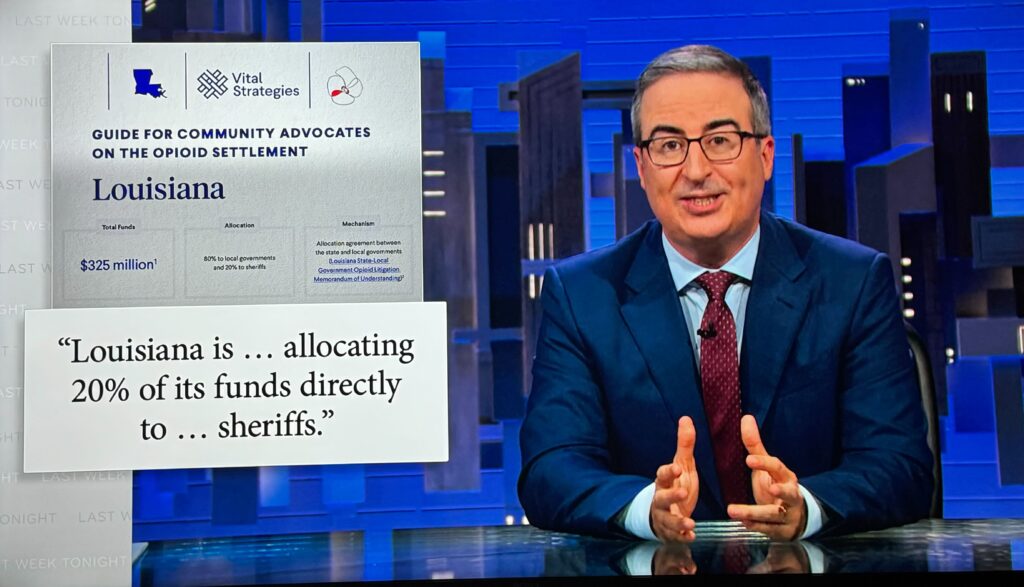By Kate Boulton and Derek Carr

The Vital Strategies Overdose Prevention Program was proud to be featured alongside its partners in a powerful 25-minute segment that aired on Last Week Tonight. Comedian and political commentator John Oliver called attention to the over $50 billion in opioid settlement funds allotted to state and local governments, and the need to channel these once in a lifetime funds into evidence-based strategies, such as harm reduction and medications for opioid use disorder.
After describing the missed opportunities of the earlier tobacco settlements as a cautionary tale, Oliver explored numerous ongoing issues related to the opioid settlements. This includes some state and local governments spending opioid settlement funds on already bloated law enforcement budgets instead of care, treatment, and other programs to address the overdose crisis. As Oliver notes, it is already well established that policing drug use does not make it stop, but it does cause immense harm to individuals and communities. Importantly, the segment also highlighted the problem of governments supplanting rather than supplementing existing services and investments, as well as the way some states and localities fail to seek community input to guide spending.
“Any time you watch this money going toward policing drug users instead of helping them, it just feels like adding insult to injury, especially to the communities of color who are so used to being overpoliced and underserved.” – John Oliver
The segment featured the groundbreaking work of Christine Minhee, founder of OpioidSettlementTracker.com, including her collaboration with the Vital Strategies Overdose Prevention Program to produce comprehensive guides on opioid settlement funds for all 50 states and the District of Columbia. These state-specific guides are tailored for on-the-ground community advocates and address key questions, such as how much money each state is getting, who gets to decide on how the funds are spent at the state and local levels, and opportunities for community members to get involved in the process. These guides and the Last Week Tonight segment both underscore the importance of community members showing up to ask tough questions and to advocate for investing opioid settlement dollars in proven, lifesaving solutions. OpioidSettlementTracker.com and Vital Strategies anticipate releasing updates to the state settlement guides later in 2024.
Vital Strategies also continues to support a range of strategies to promote the use of opioid settlement funds for health and harm reduction approaches to reduce overdose. Our work has included matching funds to North Carolina counties that invest opioid settlement funds in harm reduction and working with the Michigan Association of Counties to produce an online resource center and a toolkit, which helps local governments seeking to expand evidence-based overdose prevention efforts and harm reduction programs in their communities, with a focus on racial justice and health equity. It also includes the Opioid Settlement Principles, Resources, and Indicators (OSPRI) interactive online tool, developed by a working group from Vital Strategies and Johns Hopkins Bloomberg School of Public Health. OSPRI, which complements resources such as the Principles for the Use of Funds From the Opioid Litigation, is a guide to help counties and states invest in effective overdose prevention strategies, and provides key metrics to measure a jurisdiction’s progress towards reducing overdose risks and advancing better health outcomes.
As state and local governments continue to make decisions about how to use opioid settlement funds in the coming years, the commitment to community empowerment, transparent spending, and investment in public health and harm reduction rather than punishment is crucial.
“The good news here is that we are still pretty close to the beginning of this process, so we’re at a point where we can change the arc of this story.” – John Oliver
About Vital Strategies’ Overdose Prevention Program
Vital’s Overdose Prevention Program works to strengthen and scale evidence-based, data-driven policies and interventions to create equitable and sustainable reductions in overdose deaths. Work across seven U.S. states is supported by funding from the Bloomberg Philanthropies Overdose Prevention Initiative, launched in 2018, and by targeted investments from other partners. Learn more here.